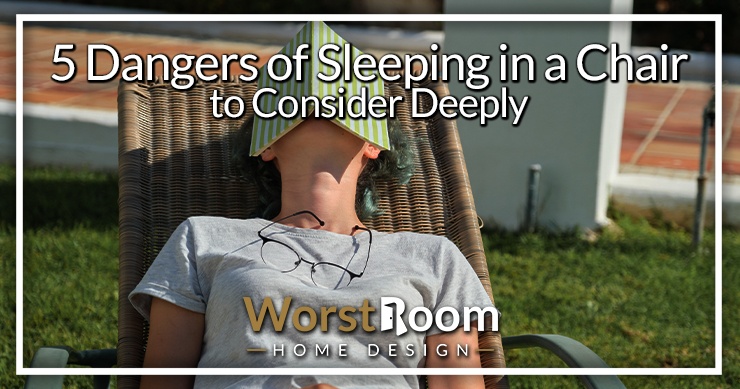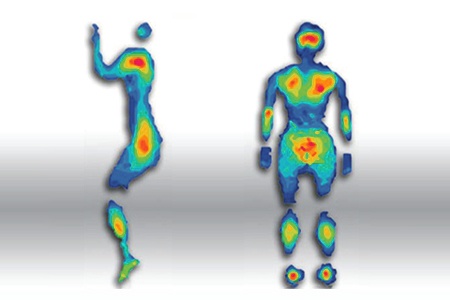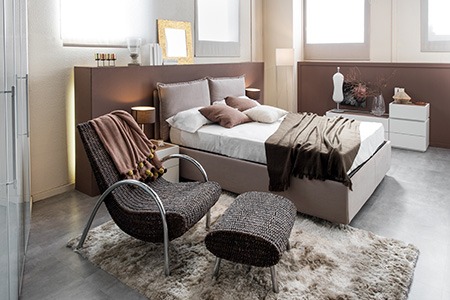5 Dangers of Sleeping in a Chair to Consider Deeply
Author: Rick Worst | Editor: Omar Alonso
Review & Research: Jen Worst & Chris Miller

Do you enjoy falling asleep in your chair, watching TV, or reading a book? It's a comfortable habit, but you should refrain from doing it often as there are some dangers of sleeping in a chair.
Sleeping in your chair might have some advantages. Maybe you're mobility-impaired and don't want to go through the pain and hassle of getting up and walking to bed late at night when you're sleepy and tired.
Or you might have a blocked nose or heart problems, and you find sleeping with your head and legs elevated gives you a better night's rest. Whatever the reasons for sleeping in your chair, it's a tradeoff between a good night's sleep and other physiological problems.
This post unpacks the dangers of sleeping sitting up in a chair and some benefits that can be used temporarily. We'll look at both sides of the story and give you some advice for choosing the right recliner if you feel your chair-sleeping habit isn't ending anytime soon.
What are the Dangers of Sleeping in a Recliner Chair?

Is it bad to sleep sitting up? Let's start with the dangers of sleeping in a chair. A recliner is great for a short nap, but you should avoid using it as a bed. Extended sleeping sessions in a chair has more healthy drawbacks than advantages in the long run.
When we sleep, the body goes into recovery mode. In the brain, the hypothalamus controls the release of hormones like cortisol, dropping it to reduce levels of inflammation in the bloodstream; it activates GABA receptors to help you get into a deep restorative sleep mode and releases growth hormone to take care of any inefficiencies in the muscular system.
Sleeping also repairs damage to the skeletal system, repairing our joints, and it reduces inflammation in the brain built up during the day. There's a lot more going on when we sleep, and if you don't get the right amount of high-quality sleep, it affects how you feel the following day.
If you're sleeping on a recliner with a tilt of 135 degrees, your spine isn't completely flat. While the recliner might have plenty of cushioning, your skeletal structure isn't designed or used to sleeping in this position. As a result, you wake up with back and hip pain the following morning or after spending a few hours asleep in the chair before making your way to bed.
A much better method of sleeping with your head and legs elevated is to use an adjustable bed frame and mattress. These provide the support your spine and the rest of your skeleton (and thus joints) require. It's all the benefits without the negatives.
Depending on your age, fitness level, and health, sleeping in a chair could significantly impact how you feel the following day. Continued sleeping in a chair could result in chronic back pain and bad hips from the incorrect posture. Let's look at the biggest dangers to your health from sleeping in the recliner.
Less Non-REM Sleep
Sleeping in the recliner doesn't allow the brain and central nervous system to reach the deep non-REM sleep phase that provides restorative and therapeutic properties. Our muscular system, heart, and CNS slow down and relax when we're in the non-REM sleep state.
The lack of mobility and space offered by sleeping in the recliner prevents the body from automatically adjusting your sleep position, resulting in less relaxation and fewer moments spent in the non-REM sleep state. So, you end up with a lighter sleep, fewer hours, and a feeling of being less rested the following day.
Weak Blood Circulation

When the recliner puts us in a fixed sleeping position with unchanging pressure points, the body can't adjust comfortably to allow optimal blood flow through the vascular system. It reduces blood flow to the extremities, which leads to a narrowing of blood capillaries over time.
The result is sub-optimal circulation which affects how you feel during the day. You'll find you have less energy and more irritability in your mood. Reduced circulation also leads to tired limbs and brain fog the next day.
Blood Clots – Deep Vein Thrombosis
One of the biggest dangers of sleeping in a chair is the potential for developing Deep Vein Thrombosis (DVT). Sleeping on the recliner is similar to sitting in an airplane chair in economy class for a few hours.
You're sitting in a bent, immovable body posture that could potentially lead to blood clots and the development of DVT. If you're over 60, you have a greater risk of experiencing the onset of this condition. Warning signs of DVT include leg cramping, swelling, and pain.
Reduced Joint Mobility
The recliner places you in an awkward sleeping position. The chair may cause pressure on joints like the hips, lower back, shoulders, and knees. The lack of movement in this position increases pressure on these areas, creating mobility and posture problems, especially in seniors.
Known as "joint contracture," these changes in body posture affect the cartilage, bone, muscle, and tendon structures. You get a shortening of the tendons, reducing your range of motion and pressure points producing pain in your joints.
Less Space for Movement
Sleeping on the recliner places you in a fixed position. The body likes to shift during sleep, especially if you're an active sleeper. Research shows the average adult changes position around 15 to 20 times when asleep.
Since you're locked in your sleeping position in the recliner, your body can't move around. As a result, you wake up several times during the night, even if it's only for a few seconds. The result is a dramatic reduction in sleep quality, affecting how you feel the following day.
Are There Any Pros to Sleeping Upright or in a Recliner?

Is it bad to sleep in a chair? Yes, but while there are significant health risks to sleeping in the recliner, there are cases where it might benefit your health, at least temporarily to find relief.
That's not a suggestion to fall asleep in your standard types of dining chairs, though. It's better to find a memory foam wedge to sleep on, or elevate the head of your bed, rather than a recliner, but you might not have access to one or don't have the budget for it.
Sleeping in the recliner won't harm you if you do it occasionally, but you want to avoid making it your nightly sleeping venue. Here are some advantages of sleeping with an elevated head or leg position.
The Benefits of Sleeping with an Elevated Head
- Reduce instances of snoring and sleep apnea
- Reduce symptoms of post-nasal drip
- Improve lymphatic drainage
- Alleviate symptoms of heartburn
The Benefits of Sleeping with Elevated Legs
- Bring down edema and swelling in the legs
- Reduce sciatica symptoms
- Reduce snoring and sleep apnea symptoms
- Lower risk of DVT and blood clot development
- Reduce the appearance of varicose veins
Sleeping with the head or leg position elevated has its advantages, though this does not mean you should disregard the dangers of sleeping in a chair. You can get some of these advantages from sleeping in the recliner, but most models don't offer options for an elevated leg position. Please don't fall asleep in the recliner for long periods. Rather use it for a short nap.
What to Consider When Buying a Recliner for Sleeping

So, what do you look for when buying a recliner? These types of chairs are nice in the home and a great choice to improve relaxation when watching TV or enjoying a good book.
Recliners offer advantages over the conventional couch, giving you a more supportive and comfortable seating position that's comfortable for the hips and back.
They're a good choice for seniors that want to avoid the spinal compression caused by sitting upright on the standard couch. Follow these tips when selecting a recliner for your lounge.
Cushioning & Support
The recliner cushioning should be supportive in the back but not too plush to let you sink into it if you sit in it for several hours watching the football game. The material should be breathable to prevent sweating which may create sores. Leather looks great, but it's the most uncomfortable material because it doesn't breathe well.
Ergonomic Features
The recliner should provide comfortable support for the head, neck, shoulders, lower back, and hips. Supportive armrests are a must-have feature. Sleeping on chairs in general isn't a great idea without the reclining capabilities, though, as that's the least ergonomic position possible.
Ensure you get a model with ergonomic reclining angles, and look for recliners offering the option of lying flat or elevating the legs above the head in a flat position. Your recliner should focus on providing good lumbar support to prevent lower back pain.
Sturdy & Durable Frame
Look for a recliner with a solid, sturdy frame. The chair frame should not move or shift when you get in and out of it. It should be solid like an expensive adirondack chair that has the ability to recline and kick its leg out. You don't want the possibility of tipping over while asleep. Look for models with smooth, lightweight movement and good locking at each position.
FAQ’s on Chair Sleeping Risks

When discussing the risks related to sleeping upright in a chair, there's some questions that always arise. Let's cover those quickly.
Should I Sleep in an Elevated or Flat Position to Help Alleviate Back Pain?
If you experience back pain from lying flat when you sleep, get yourself a foam wedge to sleep on in your bed. Don't fall asleep on the recliner. The recliner may provide temporary relief for a few hours, but it will exacerbate the problem if you sleep on it for extended periods.
Can Sleeping in a Recliner Assist with the Alleviation of Sleep Apnea Symptoms?
Yes. Sleeping in a recliner allows the throat to stay open, reducing sleep apnea symptoms in individuals with this condition. The recliner chair permits the raising of the head, keeping the airways open. However, it's better to sleep with a foam wedge in bed than to fall asleep on the recliner.
Is it a Good Idea to Sleep in a Recliner for Back Surgery Post-Recovery?
Always speak to your doctor or surgeon before implementing any lifestyle changes in your behavior and sleeping posture. While results vary between patients, people report in general that sleeping in a recliner typically alleviates some of their pain symptoms post-surgery.
Those are the Pros & Dangers of Sleeping in a Chair
Everyone knows someone (their dad or grandfather, perhaps?) who has slept in a recliner for years on end, and everything seems to be fine with them. So it seems for now.
Is sleeping sitting up bad? We should all know the dangers of sleeping in a chair and how they affect us over time before we just assume that it's okay. As always, consult your own trusted doctor for the most authoritative opinion.



